Keep Calm and Carry Ohm
22/11/08 Day 9 - Fatehpur Sikri
Keep Calm and Carry Ohm 22/11/08 Day 9 - Fatehpur Sikri |
||
We bounded out of bed bright eyed and bushy tailed after yesterday's early night. It had recharged our batteries which was fortunate because ahead of us today was the beginning of a five day road trip through nearest Rajasthan; but first breakfast. This morning we were asked for our room number and shown through into a different breakfast room. The staff denied it but the choice on offer in this room was in a different class to what we had yesterday. Julie was a far happier bunny with smoked salmon back on the menu. Even I noticed an improvement in the quality. The poori bread with chana masala that I ate was the best so far on the trip. Full marks were awarded. We met up with Bahnu beneath the grand chandelier. For some reason he had brought his brother along with him today. The family resemblance was evident, despite him being considerably older and larger. He was equally as short though. At 9am we set off for the fabled city of Fatehpur Sikri but first we had the obligatory "local market" stop that we didn't fit in yesterday. Along the way Carol filled us in on how cheerful chap Bhanu had a Dr.Jekyll moment. He turned quite nasty and pushy when they didn't wish to go the market after their sunset Taj excursion last night. He immediately dropped in our estimation. So much so that we were on the verge of staging a mutiny and refusing to get off the bus when we arrived at the shop this morning. There was a little stand off as he almost begged us to have a look around the shop. I buckled first and agreed to get off the bus to have a look if I could find myself a dhal bowl. Rob then joined me. |
The store was filled with the usual tourist knick knacks but I was immediately drawn to a side room filled with musical instruments. The owner of the store noticed my interest and came through to give Rob and I a recital on the sitar. "This is dedicated to Saraswadi, the goddess of music" he said with rock star swagger. He played us a lovely tune to the goddess of knowledge, music and all the creative arts. He obviously took his music seriously by the look on his face. |
It only had one main string to pick with several under-strings tuned to an open chord for strumming but a wire contraption he placed on my index finger felt very strange as pick. Despite plinking and plonking out a hopeless tune I thoroughly enjoyed it. |
Now he had gained my trust he went in for the sale. "You must have a statue of the goddess Saraswadi " he said. "That's a good idea" I thought. Damn he was good. I now felt that I needed to buy one. The first one he produced was a lovely brass statue of the multi-armed sitar playing goddess. "2500 rupees" he said. I suppose I should have expected it to cost four arms and a leg! |
|
Anyway, all joking aside that was far too expensive. I didn't even have that much cash in my pocket. He paraded a variety of Saraswadies in front of me, all were out of my price bracket. He finally came to the smallest sandalwood carved statue. It wasn't going to get any cheaper than this. "1500 rupees" he asked. When I laughed in his face I may have offended him! He was getting a bit agitated and a little hot under the collar of his leather jacket. Bhanu was also circling pitching in his two penneth saying "A lot of work has gone into that" It was begninning to get a little tense and eventhough I didn't want this ugly looking carving I offered 500 rupees. "No, no, no this is a work of art" It was only two inches high and looked like it had been carved by a blindman with his left foot but we met half way and I handed over a 1000 rupees. "500 for the statue and 500 for playing the sitar" I said making it sound like I had won the barter. Some people call this fun? I hate bartering. I left feeling disturbed. |
Much of this was due to the restoration work of the British Viceroy of India Lord Curzon at the turn of the 20th century. Bahnu began his work as our guide and started to tell us all the important facts; such as the large courtyard where we stood was known as the Pachisi court. Apparently the central space had a pattern laid out that was similar to a traditional boardgame called pachisi. It was a ludo-like game that Akbar, because he could, would play with dancing girls as the pieces. |
| The first building we visited was the Diwan-i-Khas, the Hall of Private Audience. The interior was quite remarkable. | ||
|
It was a debating hall where Akbar would have stood in the centre of a four spoked platform held up with incredibly ornate brackets. |
||
|
The next structure
to cast our eyes upon was the five tiered Panch Mahal.
"Panch Mahal means the wind palace" informed Bhanu. Before we got chance to tell a fart joke he explained that being open to the elements the pavillion would have been a perfect place to keep cool in the evenings. Between the pillars there would originally have been jaalis screens to give the numerous queens their privacy as they enjoyed the best views over the city. |
A little further along there was a large pool called the Anoop Talao. The green murky water was probably not the best for washing nor drinking. In the heart of the pool was a stage where courtly musicians would perform to the king who would be in the Khwabgah, the three tiered "chamber of dreams", his private sleeping quarters overlooking the Anoop Talao pond. "One famous singer was called Tansen" said Bahnu, "they say that his songs could light up oil lamps." I've heard of a voice that could shatter glass but ignite a fire? |
| Why the Turkish wives were given special note I don't know? |
When it was time to leave, Bahnu and his brother left us in the capable hands of our driver as we returned to the main Agra to Jaipur trunk road, the N11. |
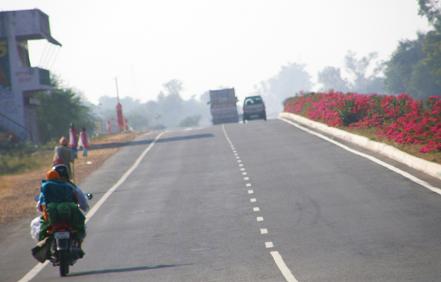 |
The condition of the road was much improved in comparison to any we'd travelled on before. It actually looked like a proper motorway. It didn't stop the madness though! We had one car doing a three-point turn to go back the way he came. We had a lorry charging its merry way towards us on our side of the road. We had ox-carts straddling the two lanes, cows standing in the fast lane grazing on the flowers, stray camels crossing, donkeys shitting, children playing. It was insane! |
At one point the road suddenly came to an end as if they had run out of money and this was as far as the tarmac went. After a scratch of his head our driver drove off the tarmac down a small embankment. He no option, it was the only way forward. "Oh no, were stuck" I heard Julie squeal. She was right. There was no way out of this roadside rut we'd fallen into. A four wheel drive vehicle would have had no problem climbing back up the rubble onto the road but our little mini bus wasn't designed for off-road driving. |
|
After another scratch of the head (and a sneeze!) he slid into a lower gear and accelerated towards the embankment. Our hearts were in our mouths as we began the climb, engine revving loudly, bouncing over the bumpy surface, slipping slightly as the wheels spun in the gravel. We all held our breaths and let out a collective sigh of relief as we made it over the ridge back onto the tarmac road. A round of applause was in order. The road was now back to a good condition. After all the excitement we pulled over for lunch at the fancy titled Maharaji's Motel. |
In fact the Malai Kofta (potato dumplings in a creamy tomato gravy) was far tastier that the motel's surroundings suggested it would be. Although they let themselves down with Carol's chips. All dirty and brown they appeared to have been cooked in centuries old oil. |
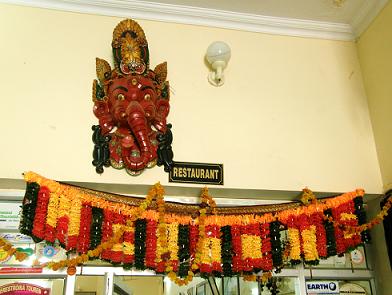 |
They redeemed themselves slightly when Carol spotted some Scottish shortbread biscuits for sale in the foyer. A little piece of home in the middle of Rajasthan. Before we left Julie popped to the toilets. When she came back out she had shock drawn all over her face. "There was a baby on the toilet floor" she said. It was the toilet attendant’s child. "When I walked in she covered it with a blanket" I suppose it wasn't unexpected yet it was still enough to shock. |
Back on the road we still had another two and a half hours ahead of us to Jaipur. It could have been a long and boring journey but I didn't tire of looking out the window. |
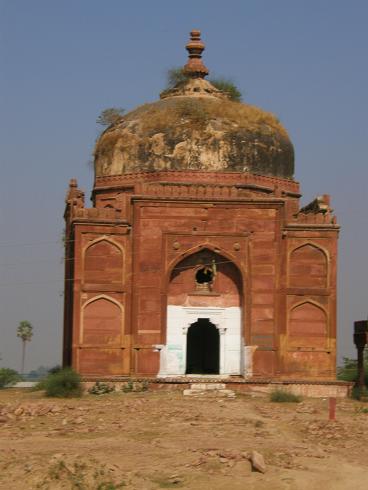 |
|
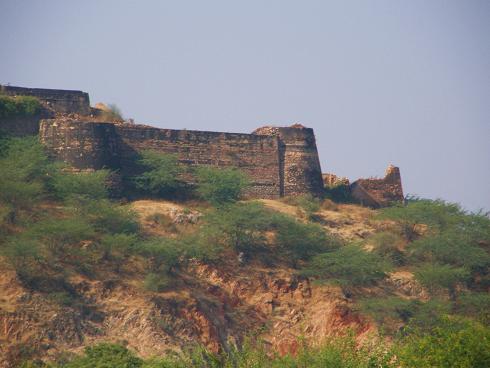 |
There were often ruined temples or a deserted hill top fort to amaze us. And if boredom began to rise a litter of piglets would scamper across the road or we would spot an abandoned bicycle in the fast line and a tired cyclist sleeping in the central reservation. What craziness! |
|
The most interesting sights however were when the road took us through a town or village. |
Perhaps they were laughing at a camel that looked like it had just been vandalised, graffitied on by a group of bored teenagers with a black marker pen. I'm sure they had scribbled on a pair of spectacles and a moustache! Or perhaps they were just laughing at a good old-fashioned fart joke! It's difficult to imagine how anyone could smile living in such circumstances. |
The poverty was heart breaking but such is the way of the world. |
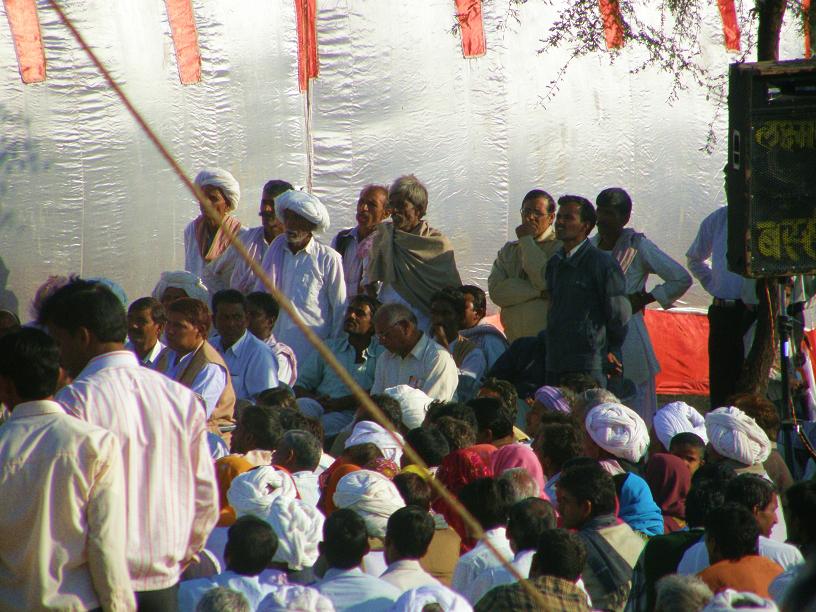 |
Such is their life. We drove through one town, Dausa, where a political rally was taking place. The politician's promise of a better life was certainly drawing in the crowds. |
| Politics definitely stirs the masses in India. |
Whilst the men listened intently to what was being said, a short distance from the arena we saw the uplifting sight of a few women taking an interest in what was being said. They were all covering their faces as is tradition in Islam but they were quite possibly Hindu. In a legacy of the muslim Mughal empire the tradition has continued to be respected by many, irrespective of faith. They didn't appear to have been invited to the debate so they had to make do with standing at the sidelines. Another less enduring legacy, I suppose. |
| The landscape gradually became more mountainous the nearer we got to Jaipur. |
|
|
Being stuck in traffic made our mini-bus more accessible to the street children who waved and smiled and politely asked for money. It was the sweetest form of begging I'd ever seen. We crawled our way through rush hour Jaipur. As we got nearer the centre Sanjey tried his luck at being a guide. "This is pinkcity" his English pronunciation wasn't the easiest to understand. |
Jaipur was the capital city of Rajasthan and certainly had the feel of a capital as we drove down wide boulevards towards large government buildings. It was very reminiscent to Delhi. I didn't see anything pink though. Whilst he wasn't the most polished of tour guides he was an accomplished driver and he got us safely to our hotel, the Rajputana Sheraton. We were met by "our man in Jaipur" who arranged our check-in. |
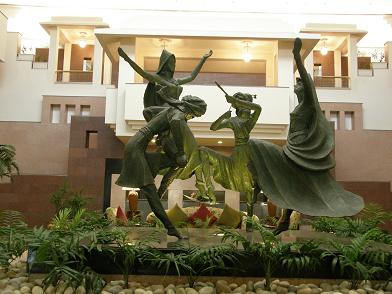 |
The receptionist showed us to our room. Along the way she pointed out the swimming pool and the preparation for a wedding reception this evening. Unless Julie wanted to splash about in the middle of the wedding guests then she would have to wait for her dip. Before we got to our room she explained that we had been upgraded to their 3rd highest standard of room. I wasn't too sure if we were meant to be impressed or not but when we stepped inside it was by far the nicest room we had stayed in on this trip. |
| She continued
to work hard for her tip by showing us where the 42" plasma screen
TV was (that'll be that big rectangle thing on the wall?),
where we could find the safe and how you could walk through the wardrobe
into the bathroom, if you so desired. She modestly received her well-earned
100 rupees tip and left quite content.
Next our suitcases arrived. The porter had wheeled them the very short distance from the reception. He stood there waiting for something to happen. He just wasn't going away. I gave him a 10 rupee note and apologised as it was the only change I had. "I take foreign currencies" he said without a hint of embarrassment or humour. I should have said "On your rickshaw pal" but I didn't. It was as if he had hypnotised me with his head wobble. I actually went searching for a 100 rupee note for him and as I was handing it over I was thinking "What the hell am I doing?" but I handed it over just the same. It felt as if I had just mugged myself! |
We spent an hour lounging in our lovely room watching English language Indian News on our experlty located for us Television. Nothing much had happened today, even the cricket had been rained off. They then came to their "And finally ...." section where usually in the UK they show cuddly stories of panda bears or puppies. Here they showed a clip of a baby being repeatedly bit on the head by a cobra! What the hell was all that about? |
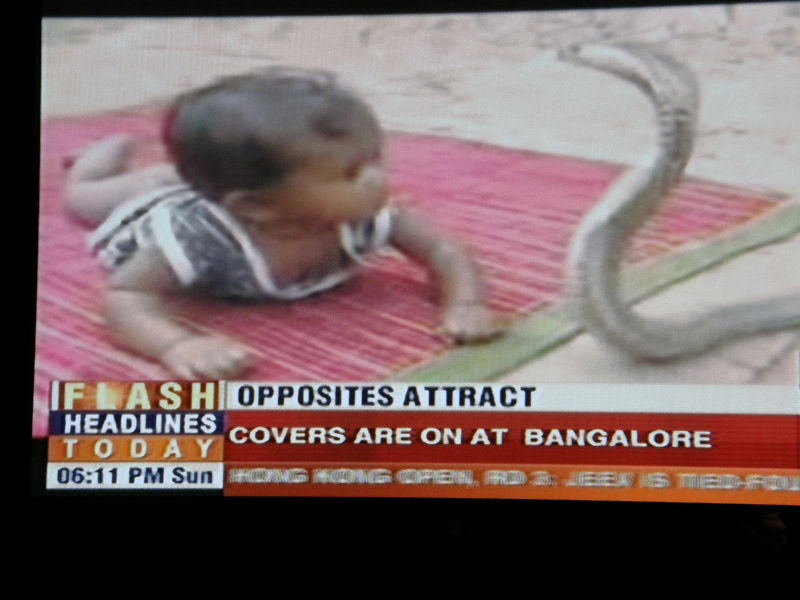 |
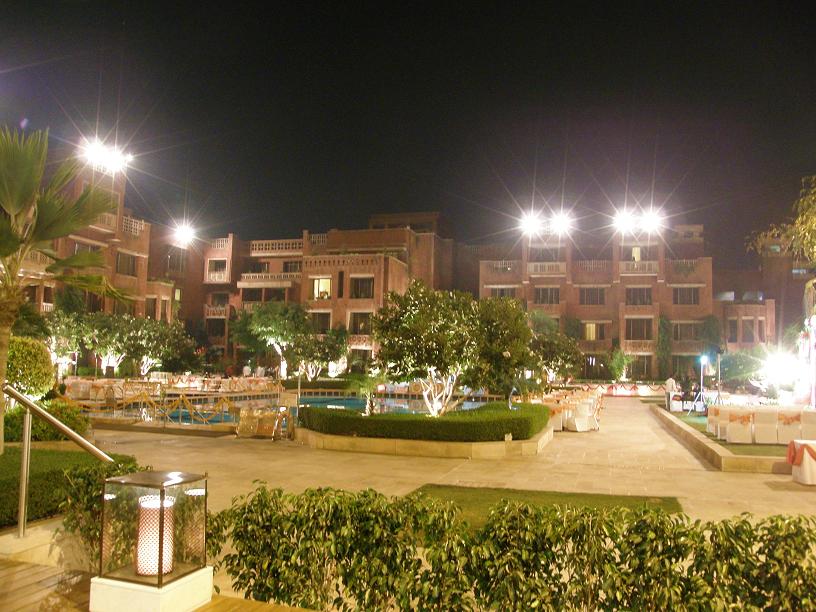 |
At 7pm we went for a look at how the wedding was going. No one had arrived yet so we decided to sit down on a large day bed overlooking the reception and wait for the bride and groom to turn up. |
|
| All this waiting was thirsty work so bottle of Golden Peacock Indian beer and a cocktail called Capricosa in a tall glass complete with umbrella was just perfect. | 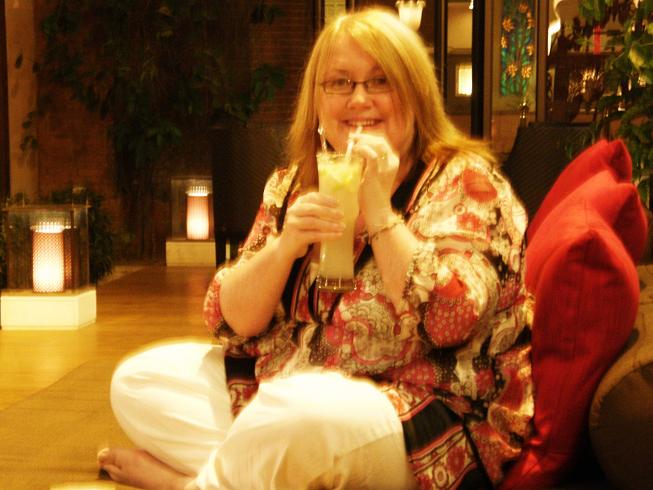 |
|
| Half
an hour later Rob & Carol joined us on the next day bed along. We
sat chatting for an hour and we still no sign of the wedding party. |
| It was getting on towards 9pm and we were beginning to get a little peckish. We decided not to leave our front row seats, we had waited this long another hour or two wouldn't hurt. | 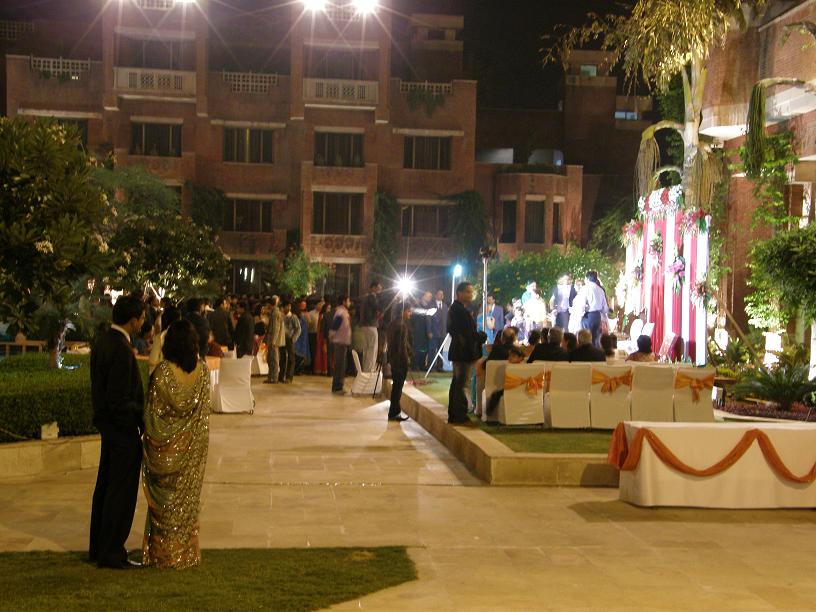 |
|
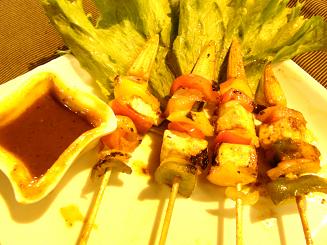 |
We shared a bar snack of paneer shashlick kebabs which were yummy delicious. |
|
| This was probably the longest spell of time we had spent in Rob and Carol's company. I know we had spent the last week travelling across India with them but we hadn't really had time to talk. We had a great laugh tonight. Carol even told us about their wedding night to remember! After their wedding ceremony they whisked themselves away to a romantic Scottish castle hideaway only to find themselves in the middle of a Mexican themed party thrown by a music producer. Amongst the illustrious Scottish musical talent was Marti Pellow and Carol ended up dancing with the Wet Wet Wet star. A great claim to fame. |
| Perhaps, I don't know, but I suppose they were making the most of being young and free as they know as soon as they get married then it's back to the traditional ways. |
We didn't hang around for long after the guests arrived. Julie and I returned to our room. The paneer shashlik earlier was just a snack so we were getting proper hungry by now! So we ordered a thali with some new Rajasthani dishes for us to experience. An Aloo Pyaz ki Sabzi, (baby potatoes and onion) a Dal Panchmel, (a delicious combination of five lentils) a Mongodi Matar (lentil dumplings with peas) and Mewa Pulao rice. Mmmm. I love this country! |
|
| Next Day > | ||
|
ęCopyright 2000 - 2020 |